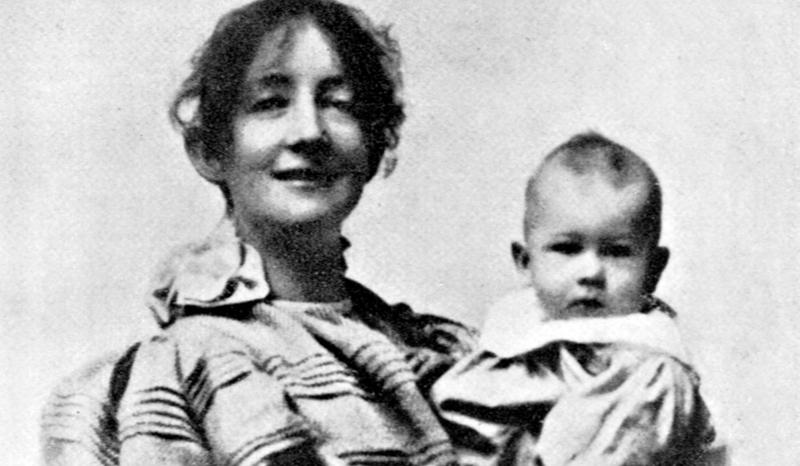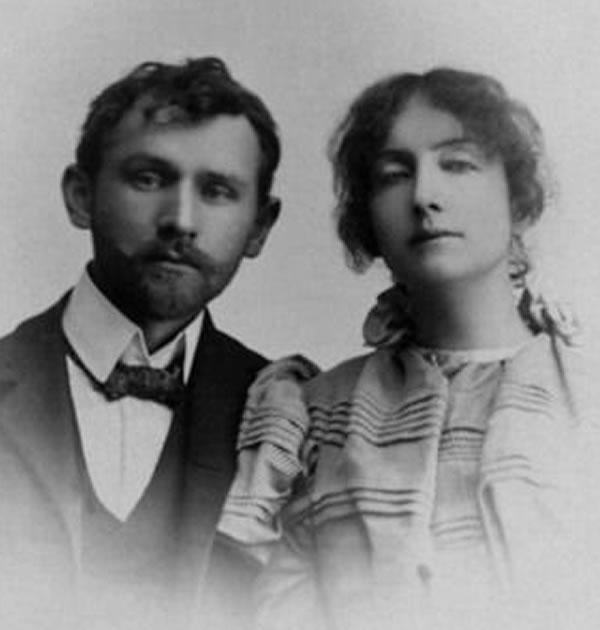Dagny Juel was born in Kognsvinger on 8 June 1867, and was one of district physician Hans Lemmich Juell and his wife Minda Blehr's four daughters. The family moved to Rolighed in 1875.
Dagny studied music in Kristiania (now Oslo) and in Berlin. The Juell-sisters are well known from the time they spent in Kristiania. The author Barbara RIng described them all as very beautiful, and well known for being so.
Dagny was the rebel of the Juell-family. In Berlin, she joined the circle of artists who held court in the inn "Zum Schwarzen Ferkel", together with Strindberg, Munch and other great artists of the time. It was here that she met the Polish author Stanislaw Przybyszewski. They got married in Berlin in 1893, and had two children, Zenon and Iwa. They lived in Berlin, but spent quite a bit of their time at Rolighed. Later on, they moved to Poland. Dagny was an active pianist all the time, giving conserts and lessons. She wrote too, both poetry and prose. Fourteen poems, four plays, one short story and four prose-lyrical texts. The tezts and two of her plays were published while she was still alive, the rest was published posthumously.
Dagny and her husband led a very turbulent life, and their marriage met a tragic end. An avid admirer of Dagny and Stanislaw from the circle of artists in Poland, Wladyslaw Emeryk, invited the family to his home in Tblisis. Her husband refused to come, but Dagny and her son Zenon travelled with Emeryk.
On the 5 June 1901, Dagny was found dead in a hotel room in Tblisi. Emeryk had shot her, while she was dozing in an arm chair, and then himself. It was never established why he killed her, whether out of jealousy, or because he was mentally unstable and delutional. Dagny Juel was buried in Tblisi, and her grave can still be found in the graveyard there.
Dagny Juel was painted as a loose woman by her contemporaries, and her qualities as an artist were not granted the attention they deserved. Not until the late 20th Century did anyone pay much attention to her works, in Norway or in Poland. From the 1960s onwards, there has been published a long line of articles, and three biographies ahve been written about the woman from Kongsvinger. There was even a Polish-Norwegian movie made about Dagny, in 1978, the same year her plays were published.
Dagny and the Museum
Kongsvinger Museum hosted a Dagny Juel-week in 1987, and in 1996, the main exhibition of the Women's Museum was "I Dagny Juels fotspor" ("following in Dagny Juel's footprints"). In 2001, 100 years after her death, the museum opened the permanent exhibition "Damen i Berlin" ("The Lady in Berlin"), in the room which used to be the Juell-sisters' bed chamber. In this room ,visitors can watch "Førtrollerskan" ("The Bewitcher"), a film produced by Swedish TV2.
The library in the Women's Museum has a section for literature on Dagny Juel. The museum shop sells the complete works of Dagny (in Norwegian), as well as the booklet "Dagny Juel" (also in Norwegian), written by Roar Lishaugen and Lisbeth A. Chumak in 2011.

